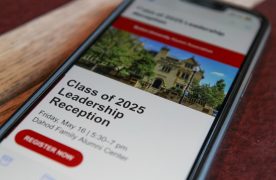Massachusetts Gov. Charlie Baker reignited a long-debated topic this week by proposing to ban handheld cellphone use while driving. Current law in the Commonwealth bans handheld cellphone use for school bus drivers, passenger bus drivers and drivers younger than 18 years old.
In 16 states, the District of Columbia, Guam, the U.S. Virgin Islands and Puerto Rico, people drive under a handheld cellphone use ban. This is a vital safety issue that spans across party, class and race. There are countless stories of people getting severely injured or dying because someone used their cellphone while on the road.
Baker previously opposed efforts to ban handheld cellphone use while driving in the state. However, in 2017, he rightly changed his mind by asserting that hands-free technology had become more affordable and that distracted driving was a serious safety issue.
And his change of mind is backed up by data. The National Safety Council has plans to lobby all 50 state governments to ban both handheld and hands-free cellphone use, as well as texting while driving.
Janet Froetscher, president and chief executive officer of the NSC, cited to ABC News a study by the Harvard Center of Risk Analysis that found cellphone use while driving accounts for approximately 6 percent of crashes each year in the United States.
That means that in total each year, Froetscher said, 636,000 crashes, 330,000 injuries, 12,000 serious injuries and 2,600 deaths are caused by phone use while driving.
Moreover, a different Harvard study estimated the cost figure for cellphone use while driving to total about $43 billion per year.
Previous efforts to ban handheld cellphone use on the road were unsuccessful in Massachusetts largely due to concerns over the potential for racial bias in enforcing the policy on the road.
Former Democratic state representative Byron Rushing said he opposed prior proposals because he believed they did not adequately require police to collect data about traffic enforcement to determine if racial bias occurred. Baker’s current proposal does not address concerns in line with Rushing’s that people of color could be unfairly treated by the police when pulled over.
With any type of infraction, there is the potential for racial bias in its enforcement. Police officers may inherently — whether subconsciously or consciously — racially profile people to some extent. But there exists already many ways that a police officer could pull someone over for a minor driving infraction.
It is important that the Legislature pass a bill that includes a database to track the race and socioeconomic status of who is pulled over and charged with violating a phone use law. This step must be taken to mitigate the possibility of racial profiling.
Baker’s proposal would allow drivers to use their phones in emergencies, a vague definition which will almost certainly end up being enforced at the discretion of an individual officer. This could lead to further racial profiling in the enforcement of the policy, as cops in whiter, wealthier suburbs may be more likely to let things slide.
Concerns over racial profiling, though, should still not prevent the underpinnings of a basic safety concern from becoming law in the state of Massachusetts. The government’s priority ought to be to protect the lives of all individuals.
Under the proposed bill, drivers could not touch electronic devices for any purpose other than “a single tap or swipe to activate, deactivate, or initiate hands-free mode.” The first offense would carry a $100 fine, a second offense would cost $250, and all future offenses would cost $500 if obtained within six years of the first offense.
Moreover, the third offense would cause an insurance surcharge.
People should pull over if they have to use their phones. However, in practice, the chances of getting pulled over for this charge are low. How often is a police officer able to see through your window?
The initial fine should be higher because, in reality, a $100 fine is not enough of a deterrent for enough people. Baker should increase the amount of the fine in his proposal. Moreover, the second time you are caught using your cell-phone should require an insurance surcharge.
Cellphone use while driving is at its heart an ambiguous issue. But under current Massachusetts law, where texting while driving is illegal but other on-screen activities are not, there is even more room for uncertainty.
Beacon Hill must do its part to mitigate the high costs of cellphone use while driving. Safety is paramount. Of course, that also means viewing a cellphone while driving from a dashboard mount — or even better, not at all.














